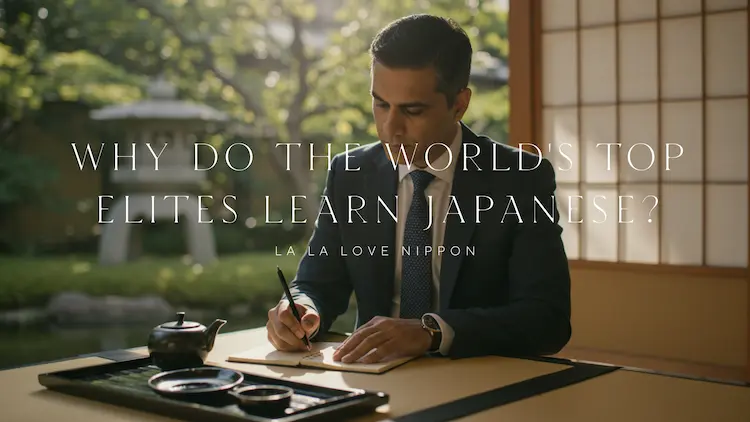Why Do the World’s Top Elites Learn Japanese?
If you are searching for your next self-investment or an intellectual experience to enrich your life, the answer may lie in an unexpected place. The one thing that top runners—from Hollywood stars and global CEOs to Michelin-starred chefs—are now discovering immense value in is learning the Japanese language.
They are not learning Japanese merely out of curiosity or as a hobby. They view it as a highly strategic “intellectual investment” to deepen their business, maximize their life experiences, and provide the best possible gift to the next generation.
This article will unveil what the world’s top elites see beyond the language and explore the profound reasons behind their motivation.
- Chapter 1: Deepening Business — The Weapon of “Cultural Respect” as Learned from the Chairman of LVMH
- Chapter 2: Maximizing the Quality of Experience — The “Story Behind the Words” Sought by Michelin-Starred Chefs
- Chapter 3: A Gift for the Next Generation — The Real Reason the Wealthy Have Their Children Learn Japanese
- In Conclusion: Adding New Value to Your Life
Chapter 1: Deepening Business — The Weapon of “Cultural Respect” as Learned from the Chairman of LVMH
Bernard Arnault, the chairman of the LVMH Group, leads the world’s largest luxury empire. His business philosophy can be summarized in one core belief: “Success is born from a deep understanding of and respect for a country’s culture.”
When LVMH undertakes bold collaborations with avant-garde Japanese artists like Yayoi Kusama or commissions architecture from Tadao Ando, it is not simply a marketing ploy. It is a high-level corporate strategy to deeply understand the values underlying Japanese aesthetics and craftsmanship and merge them with the brand’s own philosophy.
Top leaders like Arnault know that with translated words alone, business never graduates beyond the level of a “transaction.” To build unshakable trust and elevate business from a superficial relationship to one of “co-creation,” the most powerful weapon is to learn the language that allows you to respect the culture and understand the ideas and history behind it.
Learning Japanese is the first step toward gaining their perspective and acquiring true cultural capital.
Chapter 2: Maximizing the Quality of Experience — The “Story Behind the Words” Sought by Michelin-Starred Chefs

They will travel anywhere in the world for the perfect dish. The reason that chefs decorated with Michelin stars are captivated by Japan and the Japanese language stems from their relentless pursuit of excellence.
The late Joël Robuchon, a giant of French cuisine, praised Japanese ingredients as the “best in the world” and made it a point to walk through the markets himself and converse with producers. This is because behind the finest ingredients, there is always a story of the creator’s philosophy, passion, and the unique character of the land. These “soulful details” can never be fully conveyed through an interpreter.
Concepts like “Umami,” now a global term, and “Shun” (旬), a unique Japanese aesthetic celebrating the peak season of an ingredient, are essential. It is only by understanding the deep philosophy embedded in these words that cuisine is elevated to the level of art. Learning Japanese deepens the culinary experience from a mere “taste” to a “narrative” that explores culture and philosophy.
This is the same reason a wine connoisseur studies the terroir of a region. The ultimate experience begins with an understanding of the language.
Chapter 3: A Gift for the Next Generation — The Real Reason the Wealthy Have Their Children Learn Japanese


It is well-known that actors like Hugh Jackman and Milla Jovovich are having their children learn Japanese. This is not a celebrity whim. Among the world’s wealthy, Japanese language education for their children is regarded as an extremely wise “forward investment” in their future.
There are three key reasons for this:
- Character and Personal Development: After Mandarin for business, Japanese is being chosen as a language that cultivates “character.” The values of respecting others, humility, and discipline are considered indispensable qualities for leaders who will earn trust in a global society.
- Intellectual Development: The three distinct writing systems—hiragana, katakana, and kanji—along with a unique grammatical structure, are seen as a form of “intellectual gymnastics.” This complexity stimulates a child’s brain, fostering cognitive abilities and creativity.
- The “Cultural Capital” of Rarity: Unlike English or Mandarin, which many people learn, fluency in Japanese is still rare. This gives the skill immense value. In the future, it will become a unique “cultural capital” that sets one apart, attracting special opportunities in business and academia.
In Conclusion: Adding New Value to Your Life
As we have seen, for the world’s top runners, learning Japanese is no longer just language acquisition.
It is:
- A “weapon” to deepen business,
- A “key” to enriching life’s experiences,
- And an “investment” to maximize the potential of the next generation.
Now that you have the time and resources, why not embark on an intellectual adventure to reach your next stage in life? Beyond the new door that the Japanese language opens, a world you have yet to see is surely waiting.








